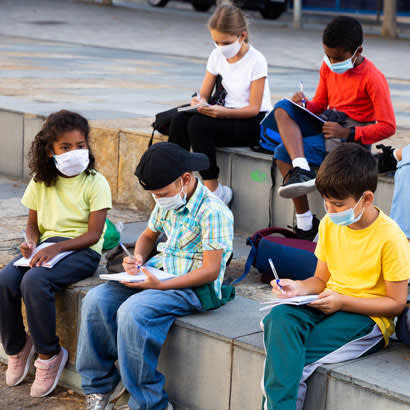
This blog post was originally posted on Afterschool Alliance’s blog, Afternoon Snack, on April 9, 2021.
A recent survey of program providers found that 3 out of 4 providers report being physically open in at least some capacity, providing critical supports including a safe and supervised space during virtual school days, distributing or delivering meals, and connecting families with community resources. Throughout the pandemic, afterschool programs have been an instrumental partner for schools and families — programs remained connected to their students, complemented school-day lessons, and provided essential supports for families.
As the country now looks to reopening and recovery, afterschool and summer programs, which decades of research have shown are able to help meet the academic, social, and emotional needs of students, will continue to be a valuable resource. This brief, “The evidence base for afterschool and summer,” synthesizes findings from nearly two dozen evaluations—including randomized and quasi-experimental studies—that demonstrate the evidence base behind afterschool and summer programs. Below are a few illustrative examples of programs’ ability to:
- Support academic growth and engagement in learning: A longitudinal study conducted by RAND of summer learning programs that followed 3rd-7th grade students found positive academic gains among randomly assigned program participants compared to the control group. After the first and second summer of program participation, program attendees outperformed control-group students. Statistically significant differences were found in math achievement after the first summer, and math, language arts, and social and emotional skills after the second summer. A 2020 evaluation of the Girls Inc. program indicates that girls who participated in the program reported more positive attitudes and behaviors than a comparison group of girls. All 14 outcomes related to academics were statistically significant in year two, including school engagement; finding school fun in areas like reading, math, and science; getting excited about science; and postsecondary readiness.
- Foster key foundational skills and boost students’ well-being: The Collaborative for Academic, Social and Emotional Learning (CASEL), conducted a meta-analysis reviewing close to six dozen studies of afterschool programs and found that students who participated in afterschool programs exhibited significant improvement in their feelings, attitudes, and indicators of behavioral adjustment. Students in programs also saw reductions in drug use and problem behavior, such as aggression, noncompliance, and conduct problems.
- Set young people up to thrive post-high school: More than 7 in 10 students who regularly participated in Virginia’s 21st CCLC programs agreed that the program helped them learn the knowledge and skills needed to be ready for a job or career (76 percent) or helped them learn what is necessary to be ready for trade school or college (71 percent) in a 2020 evaluation of the state’s 21st CCLC programs. Another study examining 158 STEM-focused afterschool programs that received support from one of 11 state afterschool networks found that students made significant gains in positive STEM attitudes, where the majority of students made significant gains in STEM engagement, career interest, career knowledge, activity participation, and identity. Latinx/Hispanic youth reported the greatest gains.
This is a small sampling of evaluations that highlighting the range of ways in which afterschool and summer programs are essential to help students re-engage in learning and emerge from the pandemic strong, resilient, and hopeful. To learn more, you can find the full brief on the Afterschool Alliance’s research page.
Nikki Yamashiro is the vice president of research for Afterschool Alliance.

